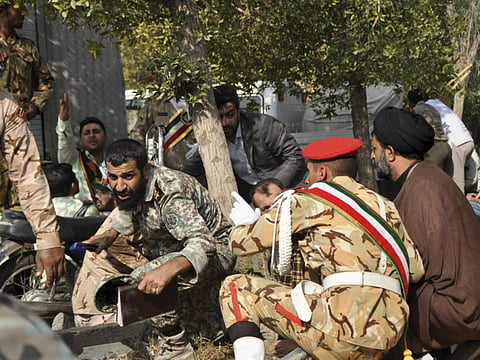After attack in Iran, the US offers a muted response
Muted stance was in contrast to that of other nations, which had offered their sympathies

In the hours after a suspected terrorist attack on a military parade in the Iranian city of Ahvaz on Saturday left more than two dozen dead, countries from around the world offered their sympathies to the victims. Some analysts wondered, however, why there wasn't a stronger response from the United States.
Neither the White House nor the State Department released statements within the first few hours after the attack. When WorldViews contacted National Security Council spokesman Garrett Marquis on Saturday afternoon to ask if a statement from the White House would be coming, Marquis offered his own brief response.
"The United States stands with the Iranian people and encourages the regime in Tehran to focus on keeping them safe at home," Marquis said in an emailed statement.
The State Department later offered a statement from spokeswoman Heather Nauert, who said that the U.S. government was aware of the reports of an attack. "We stand with the Iranian people against the scourge of radical terrorism and express our sympathy to them at this terrible time," Nauert said.
This muted stance was in contrast to that of other nations, which had offered their sympathies to the victims and condemnation of the attack, with several ambassadors in Tehran writing their own personal messages, while heads of state such as Russian President Vladimir Putin released official statements.
The United States was not the only country to delay its messages of condolences to Iran - notably, unlike many other nations, it does not have an ambassador in Tehran. However, some analysts suggested that the scale of the attack merited a response from a senior U.S. figure.
President Donald Trump himself often offers quick responses on Twitter to suspected terrorist attacks, especially those that appear to have been perpetrated by Daesh.
Daesh released a statement that claimed responsibility for Saturday's attack shortly after it occurred, though a separatist Arab militant group also claimed it was behind the attack. It was not immediately clear if either group had organized the violence.
Last year, after two attacks linked to Daesh left 23 dead in Tehran, the White House released an official statement from the president that offered sympathy for the victims of the attack, but added that "states that sponsor terrorism risk falling victim to the evil they promote."
Iranian Foreign Minister Javad Zarif later called the message "repugnant."
Tehran and Washington have had tense relations over a wide variety of issues, including Iran's nuclear program and American influence in the Middle East, for many years. The two nations have not had formal diplomatic relations since 1980.
However, under the Trump administration, these relations have deteriorated further as the American leader pulled the United States out of a nuclear agreement that had been agreed to with Iran and other nations under his predecessor, President Barack Obama, and moved to reimpose sanctions on Tehran.
Iranian leaders accused the United States of complicity in the attacks in Ahvaz. On Twitter, Iran's supreme leader, Ayatollah Ali Khamenei, blamed the attack on American allies in the region, calling it "a continuation of conspiracies by US-backed regimes in [the] region which have aimed at creating insecurity in our dear country."
A number of Iranian officials, including Zarif and President Hassan Rouhani, are expected to travel to Trump's hometown of New York City next week for high-level meetings at the United Nations General Assembly. Though many are expecting a tense reception from the American leader, Trump has suggested he would be open to meeting Rouhani on the sidelines of the U.N. events.



